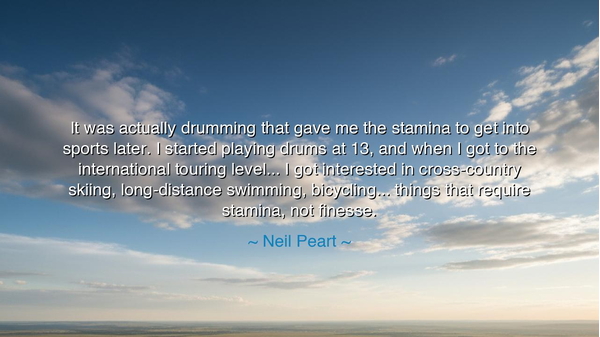
It was actually drumming that gave me the stamina to get into
It was actually drumming that gave me the stamina to get into sports later. I started playing drums at 13, and when I got to the international touring level... I got interested in cross-country skiing, long-distance swimming, bicycling... things that require stamina, not finesse.






The legendary drummer and lyricist Neil Peart once reflected: “It was actually drumming that gave me the stamina to get into sports later. I started playing drums at 13, and when I got to the international touring level... I got interested in cross-country skiing, long-distance swimming, bicycling... things that require stamina, not finesse.” In these words, we hear a profound truth that transcends music and sport alike: that discipline, endurance, and sustained effort in one pursuit can prepare the body and spirit for excellence in others. Peart’s journey reveals that mastery is often cumulative, built upon foundations laid in unexpected arenas.
This quote underscores the transformative power of stamina and persistence. Drumming, often perceived as purely artistic, demands physical endurance, mental focus, and precision under pressure. These qualities, once cultivated, allowed Peart to embrace sports requiring sustained effort rather than mere technical skill. His insight reveals that preparation in one field, even an art form, can strengthen us for challenges in other domains, demonstrating the interconnectedness of human endeavor.
History offers many parallels. Consider the Roman soldiers, who trained daily with drills, marching, and combat exercises. The stamina and endurance they developed in routine training prepared them for the chaos and demands of battle. Like Peart, their initial discipline was not simply for the immediate task but became transferable to greater challenges. The cultivation of endurance in one practice often equips the individual for unforeseen tests of physical and mental fortitude.
The meaning of Peart’s reflection also emphasizes the principle of holistic development. While finesse and technical skill have their place, the capacity to sustain effort over time—stamina—is essential for lasting achievement. Cross-country skiing, long-distance swimming, and bicycling are metaphors for life itself: success is often determined not by moments of brilliance but by persistence, discipline, and the steady application of energy toward a goal. Peart’s journey illustrates that these virtues are cultivated through consistent practice, even in areas not traditionally associated with them.
Even in contemporary contexts, this principle remains evident. Michael Phelps, the greatest Olympic swimmer of all time, began his career with dry-land training that built stamina and endurance, which later translated to success in the pool. Peart’s experience mirrors this truth: the preparation, stamina, and discipline developed in one domain enhance performance in another, revealing the profound interconnectedness of training, habit, and achievement.
The lesson for life is both practical and inspiring: cultivate skills and stamina in whatever endeavor you pursue, knowing that these qualities will serve you beyond their immediate application. Engage fully in practice, endure through challenges, and embrace disciplines that test persistence over flashiness. Practical action includes establishing consistent routines, setting long-term goals, and embracing activities that push physical, mental, and emotional limits.
Thus, Neil Peart’s quote endures as a timeless guide for those seeking mastery. It teaches that excellence is cumulative, that stamina and discipline are transferable virtues, and that preparation in one realm can empower success in another. Let us follow his example: cultivate endurance, embrace sustained effort, and recognize that the practices we commit to today lay the groundwork for triumphs yet unseen, across all arenas of life.






AAdministratorAdministrator
Welcome, honored guests. Please leave a comment, we will respond soon